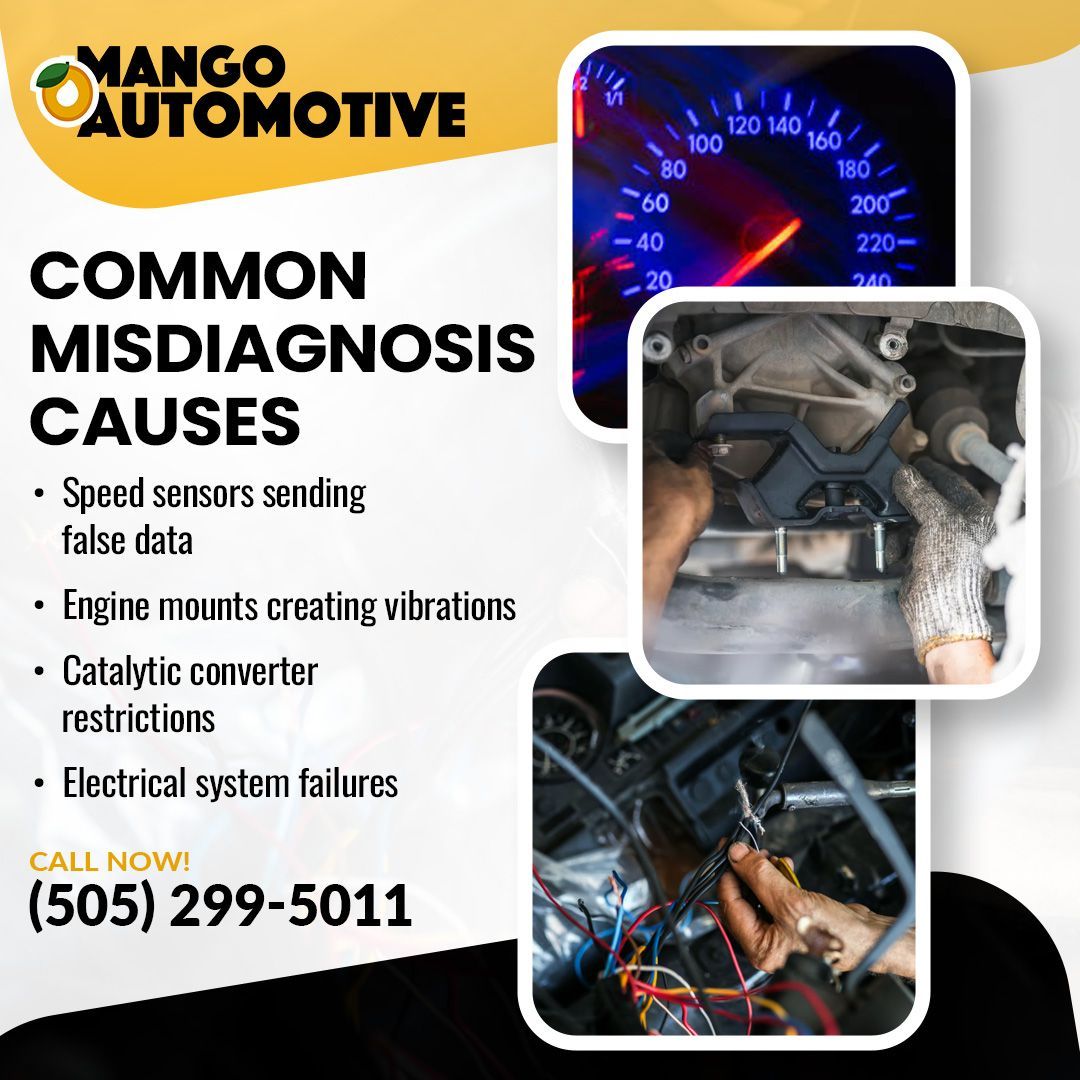Auto Repair in Albuquerque: Fix Stalling Gasoline Engines with the Experts
A stalling gasoline engine typically results from fuel system problems, ignition failures, or sensor malfunctions that disrupt the proper air-fuel mixture. Most stalling issues stem from dirty fuel filters, faulty spark plugs, or clogged idle air control valves that prevent your engine from receiving adequate fuel or spark. These problems can worsen in Albuquerque's high-altitude environment, due to thinner air affecting combustion efficiency.
At
Mango Automotive, our ASE-certified technicians quickly identify the root cause of stalling issues using advanced diagnostic equipment, preventing further damage. Simple maintenance like replacing spark plugs every 30,000 miles and changing fuel filters every 15,000 miles prevents many stalling problems. However, complex issues involving fuel pumps, sensors, or electronic systems require professional automotive repair to ensure proper resolution and avoid costly mistakes. Mango Automotive has earned the trust of drivers by delivering reliable
auto repairs in Albuquerque that are backed by our comprehensive warranty coverage. Our commitment to quality repair services makes sure your vehicle receives the expert attention it deserves.

Common Causes of Gasoline Engine Stalling
Engine stalling occurs when combustion stops unexpectedly, cutting power to your vehicle. Understanding the underlying systems helps you determine whether you need immediate professional automotive repair attention from experienced auto repair shops like Mango Automotive.
Fuel System Failures Lead to Most Stalling Problems
Fuel system issues (such as faulty fuel pumps, clogged fuel filters, contaminated fuel, or injector problems) are among the common causes of engine stalling. Your engine needs consistent fuel pressure and clean gasoline to maintain combustion. Several components can fail and interrupt this process.
A failing fuel pump cannot maintain adequate pressure, starving your engine of the gasoline it needs. This problem often starts as occasional stalling during acceleration or when climbing hills around Albuquerque, then progresses to complete failure. Fuel pumps typically last 100,000 miles before replacement becomes necessary through professional automotive repair.
Clogged fuel filters block contaminated fuel from reaching your engine, but eventually restrict flow too much. Dirty fuel filters cause gradual performance loss, starting with hesitation during acceleration and eventually leading to stalling. For gasoline engines, replacing fuel filters every 30,000 to 60,000 miles is typical under normal driving, with some models requiring more frequent changes if conditions are harsh or if the vehicle is older.
When injectors become clogged with deposits or fail electronically, they cannot spray the correct amount of fuel into cylinders. This creates an imbalanced air-fuel mixture that causes rough idling, misfiring, and eventual stalling that requires professional diagnosis and cleaning or replacement services.
Ignition System Problems Stop Engine Combustion
Ignition system issues, which include problems with spark plugs, ignition coils, distributor, ignition timing, and related electrical components, frequently contribute to engine stalling. Your engine requires properly timed sparks to ignite the fuel-air mixture in each cylinder. When ignition components fail, combustion becomes inconsistent or stops entirely.
Worn spark plugs cannot generate strong enough sparks to reliably ignite fuel. Old plugs develop carbon deposits, worn electrodes, or damaged insulators that prevent consistent firing. Replace spark plugs every 30,000 miles for conventional plugs or 100,000 miles for platinum or iridium plugs to maintain reliable ignition and prevent stalling issues.
Faulty ignition coils fail to provide adequate voltage to spark plugs. Modern engines use individual coils for each cylinder, so a single coil failure typically causes misfiring in one cylinder before progressing to stalling. Coil failures often trigger check engine lights with specific trouble codes that modern diagnostic equipment can quickly identify and interpret.
Bad crankshaft or camshaft position sensors confuse your engine's computer about timing. These sensors tell the engine control unit when to fire spark plugs and inject fuel. Sensor failures create erratic timing that causes rough running, stalling, or complete failure to start, requiring the specialized sensor testing capabilities available at professional auto repair shops.
Air Intake and Electronic Sensor Malfunctions
Air intake problems and sensor failures are other common causes of stalling issues. Modern engines rely on precise air-fuel ratios maintained by various sensors and control systems. Issues such as a clogged air filter, a faulty mass air flow (MAF) sensor, a dirty throttle body, and failures of key engine sensors can stall the engine. It requires professional automotive repair expertise to fix them.
An issue with the mass airflow sensor sends incorrect data to your engine's computer. This sensor measures incoming air volume and helps calculate proper fuel injection amounts. A dirty or failed mass airflow sensor causes the engine to run too rich or too lean, resulting in poor performance and stalling.
Idle air control valve malfunctions prevent proper idle speed regulation. This valve controls airflow around the throttle plate when your foot is off the accelerator. A stuck or dirty idle air control valve cannot maintain a steady idle speed, causing stalling when coming to stops or during idle conditions common in Albuquerque traffic.
Throttle body carbon buildup restricts airflow into your engine. Over time, carbon deposits accumulate on throttle plates and passages, reducing air intake. This problem develops gradually but eventually causes stalling, especially during idle or low-speed driving, and benefits from the professional cleaning services that auto repair shops provide.
Engine Stalling Diagnosis Methods
Proper diagnosis starts with observing when stalling occurs and what symptoms accompany the problem. Professional auto repair technicians use diagnostic tools and systematic testing to identify root causes, but understanding basic diagnostic principles helps you communicate effectively with mechanics.
Recording Stalling Patterns and Warning Signs
Document when stalling happens to identify patterns that help automotive repair professionals diagnose the problem efficiently. Note whether stalling occurs during cold starts, hot weather, acceleration, deceleration, or idle conditions. Stalling that happens only when hot suggests fuel vapor lock or heat-related component failures, while cold stalling often indicates fuel system or sensor problems requiring professional automotive repair.
Pay attention to warning signs before stalling. Engine hesitation, rough idling, unusual sounds, or dashboard warning lights provide clues about failing components that experienced technicians can interpret during diagnostic evaluation. Check engine lights specifically indicate electronic system problems that diagnostic scanners can identify with trouble codes.
Monitor how your vehicle responds to restart attempts. Engines that restart immediately after stalling typically have intermittent electrical problems, while engines requiring extended cranking suggest fuel delivery issues. Engines that refuse to restart often have complete fuel pump or ignition system failures that require immediate professional attention from qualified auto repair shops.
Professional Diagnostic Equipment and Testing
Computerized diagnostic scanners can be used to read trouble codes stored in your engine's control module. These codes point technicians toward specific systems or components experiencing problems, reducing diagnostic time and improving repair accuracy.
Fuel pressure testing determines whether your fuel system delivers adequate pressure and volume. Low pressure indicates fuel pump problems, while pressure that bleeds off quickly suggests leaking injectors or a faulty pressure regulator that requires professional automotive repair expertise.
Spark strength, timing, and consistency across all cylinders are checked using ignition system testing. Oscilloscopes display spark patterns that reveal weak coils, worn plugs, or timing problems. This advanced testing identifies intermittent ignition problems that might not trigger trouble codes immediately..
Sensor testing verifies that mass airflow, oxygen, and position sensors provide accurate data to your engine's computer. Faulty sensors often cause adaptive learning problems where your engine's computer makes incorrect adjustments to compensate for bad information, creating complex diagnostic challenges that benefit from professional expertise.
Professional Auto Repair for Engine Stalling Issues
Engine stalling problems require professional automotive repair expertise to ensure accurate diagnosis and safe, lasting repairs. While some basic maintenance might seem manageable, the complexity of modern engine systems and the safety risks involved make professional service the recommended approach for all stalling-related issues. Seek professional help immediately if stalling occurs while driving, especially at highway speeds or in traffic, as these situations create serious safety hazards that require urgent attention.
Why Professional Diagnosis is Essential
Even seemingly simple maintenance tasks can mask underlying problems that require professional attention. What appears to be a basic spark plug issue might actually indicate fuel system problems, ignition timing issues, or sensor malfunctions that need comprehensive diagnosis.
An incorrect diagnosis leads to wasted time and money replacing the wrong components while the actual problem persists or worsens. At Mango Automotive, we use advanced diagnostic equipment to identify root causes accurately, preventing unnecessary part replacements and ensuring complete problem resolution.
Modern engines integrate multiple systems that interact in complex ways. A stalling problem might involve fuel delivery, ignition timing, air intake management, and electronic control systems simultaneously. Only professional technicians have the training and equipment to evaluate these interconnected systems properly.
Emergency Stalling Situations Require Immediate Attention
Stalling during highway driving can cause accidents due to sudden loss of power steering and brake assist. Modern vehicles rely on engine-driven hydraulic systems for steering and brake assistance. When engines stall at speed, these systems lose power, making vehicle control difficult and creating dangerous situations that require immediate professional attention.
Frequent stalling in traffic creates dangerous situations for you and other drivers. Engines that stall unpredictably can cause rear-end collisions or leave you stranded in dangerous locations. Check engine lights combined with stalling indicate serious electronic system problems that require immediate professional diagnosis from experienced automotive repair technicians.
Complex Repairs Requiring Professional Auto Repair
Fuel system repairs involve pressurized lines and potentially dangerous gasoline vapors. Fuel pump replacement requires dropping fuel tanks and handling electrical connections in explosive environments. These repairs demand proper safety equipment and training that professional Albuquerque automotive repair shops like Mango Automotive provide for technicians and customer safety.
Electronic system diagnosis requires expensive scanners and software that most consumers cannot justify purchasing. Modern engines use complex computer networks that interact with dozens of sensors and actuators. At Mango Automotive, our technicians receive ongoing training to understand these systems, interpret diagnostic data correctly, and provide accurate auto repairs in Albuquerque.
Engine timing repairs involving camshaft or crankshaft sensors affect critical engine operation. Incorrect installation or calibration can cause severe engine damage. These repairs require precise procedures and specialized tools, making professional service from experienced
auto repair shops the safest choice.
Engine Stalling Solutions from Mango Automotive
Mango Automotive provides diagnosis and expert repair for engine stalling problems throughout Albuquerque and nearby areas. Our ASE-certified technicians use modern diagnostic equipment to quickly identify the root causes of stalling issues, providing efficient resolution that gets you back on the road safely.
Advanced Diagnostic Capabilities
Our Albuquerque automotive repair team uses professional-grade diagnostic scanners and testing equipment to pinpoint stalling problems accurately. We can diagnose complex fuel system issues, ignition problems, and sensor malfunctions that cause engine stalling in all makes and models of vehicles, from domestic cars to luxury imports.
Our diagnostic process includes fuel pressure testing, ignition system analysis, and sensor verification to identify all contributing factors to your stalling problem. This thorough approach prevents comeback repairs and provides lasting solutions that address root causes rather than symptoms.
We provide detailed explanations of diagnostic findings and repair recommendations, helping you understand the problem and make informed decisions about necessary automotive repair services.
Complete Engine Repair Services
Our experienced Albuquerque automotive repair technicians perform all types of engine stalling repairs, from simple spark plug replacement to complex fuel pump installation and electronic system repairs. We use high-quality OEM or equivalent parts to provide reliable, long-lasting auto repairs that maintain your vehicle's performance and safety.
Mango Automotive offers fuel system cleaning services, ignition system tune-ups, and sensor replacement using the latest repair techniques and equipment. Our approach addresses not just the immediate stalling problem but also prevents related issues that could cause future breakdowns, saving you time and inconvenience.
Customer-Focused Service Experience
At Mango Automotive, we offer transparent estimates with detailed explanations before beginning any work. We prioritize clear communication throughout the repair process, keeping you informed about diagnostic findings, repair progress, and completion timelines so you can plan accordingly.
Our convenient location makes it easy to access professional auto repairs in Albuquerque. We also provide comfortable waiting areas with refreshments while our technicians work on your vehicle.
As a woman-owned business with Jesse Jackson, our "Auto Repair Queen," leading our team, Mango Automotive combines technical expertise with genuine care for our customers' automotive repair needs and safety, building lasting relationships based on trust and quality service.
Get Expert Engine Stalling Repair in Albuquerque
Is your engine stalling unexpectedly? Don't wait for a dangerous breakdown. At Mango Automotive, our technicians quickly diagnose engine stalling problems using modern diagnostic equipment. We've helped Albuquerque drivers resolve engine issues for years with reliable auto repair services. Call Mango Automotive at (505) 299-5011 for professional engine diagnosis and auto repairs in Albuquerque.












